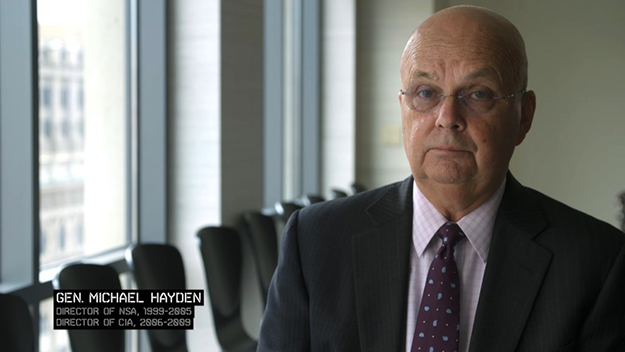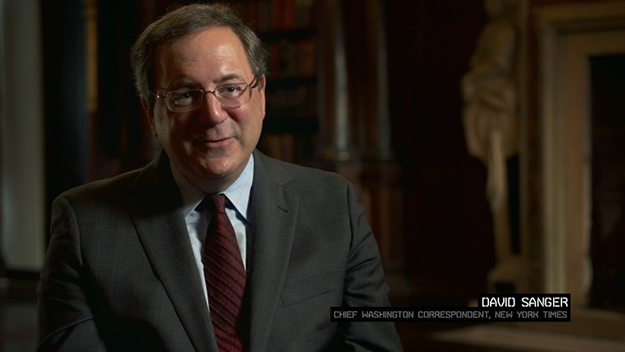Deep Focus: Zero Days
The provocative new documentary Zero Days, a j’accuse aimed at American cyber warfare by the ultra-gifted and industrious Alex Gibney, has been promoted as a “thriller.” Unfortunately, that thriller is Michael Mann’s Blackhat. It’s natural that two of our most talented and adventurous filmmakers, Gibney and Mann, would take up the challenge of depicting how virtual manipulation can lead to physical destruction. These filmmakers stumble partly because they can’t cut a clear course through uncharted waters or overcome the visual and dramatic monotony of the digital universe, no matter how fancy and insistent their CGI effects.
Zero Days also suffers from a surprising lack of cogency. The peg for Gibney’s investigation is the super-worm that invaded Iran’s underground nuclear plant at Natanz and temporarily succeeded in sabotaging many of its centrifuges. (Not long after Iran discovered that this virus was the culprit, the program ramped right up again.) As chronicled by New York Times reporter David Sanger (who appears in the movie, provides it with journalistic bedrock, and earlier this year confirmed some of Gibney’s findings), American and Israeli intelligence and military developed this malware and collaborated on a strategy for using it. They hatched the scheme to slow or stop Iran’s development of nuclear weapons when Mahmoud Ahmadinejad was threatening Israel with elimination, and some Arab states were urging Washington to destroy his nuclear capability by any means necessary. According to Sanger, the first attacks occurred in 2008 and continued even after the worm escaped from the Natanz plant and crisscrossed the globe in 2010, leading to its identification.
Yet Gibney begins Zero Days with an excerpt from an Iranian State Television documentary recreating an alleged Mossad attempt, in 2012, to assassinate two Iranian nuclear scientists. (One was killed, the other wounded.) Gibney thinks he’s building the case that cyber warfare, like targeted assassinations, have inspired young Iranians to rally ’round their nuclear program. But by the time Gibney actually makes that point, an hour and a half into his movie, you think, not “of course,” but “what is this movie about?” Gibney wants it to be about everything in the general vicinity of that malware, including a problematic partnership between the Bush and Obama administrations in Washington and Benjamin Netanyahu’s in Jerusalem.
Unable to get authorities and witnesses to talk on the record, Gibney resorts to Michael Moore–like tricks, such as cutting together a montage of security and intelligence experts repeating synonyms for No Comment. In a rare case, for him, of “listen to me” journalism, Gibney voices his own anger and impatience on the sound track. Whenever he’s entered his own work before, as in his Lance Armstrong documentary (The Armstrong Lie), he did it to elucidate the story. Here it smacks of desperation.
The movie peaks early, when antivirus experts Eric Chien and Liam O’Murchu, of the cyber-security company Symantec, describe how they analyzed the malware and named it “Stuxnet” (based on two syllables that came up frequently in the coding). Chien and O’Murchu are affable professionals, and as they and other experts explain Stuxnet’s abilities to replicate itself and single out specific areas and devices in the Natanz plant, the movie is revealing and engrossing. But their vision is limited. They’re no big help when Gibney, relying heavily on tension music, hits the panic button about democratic governments engaging in secret combat by computer. For assistance in outlining the gravity of cyber warfare, he turns to familiar talking heads like counter-terrorism authority Richard A. Clarke and Michael V. Hayden (who also appeared in Gibney’s excellent WikiLeaks movie We Steal Secrets), a former director of the CIA and the National Security Agency. Gibney contends that virtual armaments like Stuxnet must be submitted to the sort of public debate that gradually emerged over nuclear weapons. He argues that launching Stuxnet is as much of a game-changer as dropping the A-bomb. As Hayden once told Sanger: “Previous cyberattacks had effects limited to other computers. This is the first attack of a major nature in which a cyberattack was used to effect physical destruction.”
In 2015 alone, Gibney directed a fearless, first-class exposé, Going Clear: Scientology and the Prison of Belief; a smart and also lilting portrait of a musical giant, Sinatra: All or Nothing at All; and the messy, multifaceted Steve Jobs: The Man in the Machine, which makes you think about the human and social costs of Jobs’s complicated life and achievements far more than Danny Boyle’s and Aaron Sorkin’s Steve Jobs. Gibney is a filmmaker who relishes a new test, and he usually aces it. That doesn’t happen in Zero Days. A composite character hijacks the second half of the movie. This fact-based fictional member of the NSA’s Cyber Command—actually several “whistleblowers” rolled into one, then put into a digital female profile—delivers urgent testimony which has been rewritten to hide the sources’ identities. (Joanne Tucker gives a spunky vocal performance.) Gibney has been developing a political suspense film about ’70s activists who pilfer classified FBI documents to prove that J. Edgar Hoover is taking aim at antiwar and civil rights groups. Maybe it is time for Gibney to move on to total fiction.
The creature he fabricates for Zero Days boasts more personality than anyone else in the movie. She describes Cyber Command culture as part macho and part geek, and she’s heavy on the macho attitude herself. Her speech has a swagger as she introduces and/or strengthens some of Gibney’s arguments: the U.S. has devoted too much time and energy to cyber offense—including a grid-crippling weapon called “Nitro Zeus”—and not enough to cyber defense; U.S. Department of Defense officials routinely underestimate the human cost of cyber attacks on infrastructure; and nation states could easily set off wars by mistaking digital signatures, because cyber attacks can be designed and dispatched in one country and controlled in another. She contends that Cyber Command computer jocks were jubilant when Iran and the major powers signed their nuclear deal, cheering for diplomacy to work. She forcefully condemns the Israelis for being impatient and revamping Stuxnet to be even more aggressive. As a result, she says, they added an error to the coding that triggered its worldwide spread and ultimate discovery.
Sanger, too, has reported this suspicion, though he supplied this caveat: “In fact, both the Israelis and the Americans had been aiming for a particular part of the centrifuge plant, a critical area whose loss, they had concluded, would set the Iranians back considerably. It is unclear who introduced the programming error.” How did Gibney find and vet these whistleblowers? Could their claim that Israel was responsible for Stuxnet running wild be self-serving? Sanger has given credit to Mr. Gibney and his investigative team, led by Javier Botero, for uncovering the Nitro Zeus program.
Gibney weakens his presentation with a rushed, broad-stroke depiction of the Iran debate. He presents it as a given that settling on terms for nuclear power with a state like Iran is the same as it was for the U.S. negotiating with a superpower like the Soviet Union. In the film, the main figure shown opposing the deal is Netanyahu at his bloviating worst, grandstanding at the U.N. What if the spokesman Gibney chose to represent the opposition had been someone more sympathetic—say, Elie Wiesel? And if the Iran deal were such a no-brainer, why would members of the New York Times editorial board, major backers of the agreement at the time, buttress its judgment just this week with the opinion of former Israeli defense minister Moshe Ya’alon, whose warning about the deal has turned to endorsement?
Gibney is surely right in calling for open and informed debate about cyber warfare, but his own movie lacks transparency and persuasiveness. What a terrible moment for this director to go unclear.
Michael Sragow is a contributing editor to FILM COMMENT and writes its Deep Focus column. He is a member of the National Society of Film Critics and the Los Angeles Film Critics Association. He also curates “The Moviegoer” at the Library of America website.









